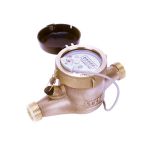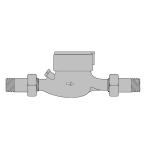Seametrics MJNE-075 MJN-Series 3/4" NSF Bronze Body Pulse Meter w/ Solid-state Sensor
- Specification
- Overview
- Accessories
- Customers Also Bought
- Your Recently Viewed Items
- Reviews



Overview
MJN-Series meters use the multi-jet principle, which has been an internationally-accepted standard for many years. This type of meter is known for its wide range, simplicity, and accuracy. The Seametrics MJN-Series is certified to NSF/ANSI standard 61. The impeller is centered in a ring of jets, with inlet jets on one level and outlet jets on another. A gear train drives the register totalizer dials. For pulse output, one of the pointers is replaced by a magnet, which is detected by an encapsulated sensor attached to the outside of the lens. Pulse rate is determined by the dial on which the magnet is placed, and by the number of sensors (single or double).
Changing the pulse rate can be done easily in the field.
The MJN-Series has a brass body and is available in 3/4" version.
MJNE meters use a solid-state, long-lasting Hall-effect sensor, which requires power. It is suited for use with Seametrics controls and metering pumps that have sensor power.
Features
- Certified to NSF/ANSI standard 61
- Dry top multi-jet design
- Tolerates low quality water
- Simple pulse output
Applications
- Potable water
- Cooling tower chemical control
- Industrial water treatment
- Deduct metering
- Pump Pacing
Options
- LMI 4-pin pump connector
- Seametrics 3-pin control connector
- LMI 5-pin pump connector
Options (Pulse Rate)
- 10P = 10 Pulse/Gal (3/4" only)
- 1G = 1 Gal/Pulse
- 10G = 10 Gal/Pulse
- 100G = 100 Gal/Pulse
- 1CF = 1 CF/Pulse
- 10CF = 10 CF/Pulse
- 1CM = 1 Pulse/CM
- 10CM = 10 Pulse/CM
- 100CM = 100 Pulse/CM
- 1L = 1 Liter/Pulse
- 10L = 10 Liter/Pulse
- 100L = 100 Liter/Pulse
For more information, please see Data Sheet and Manual

